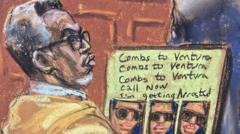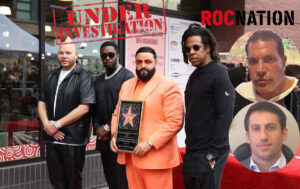The federal trial against Sean "Diddy" Combs reveals a tangled web of allegations, poignant testimonies, and legal complexities, raising questions about the strength of the prosecution's case and the defense's next moves.
Unpacking the Complexity of the Diddy Trial: A Mixed Bag of Evidence and Defense Strategies

Unpacking the Complexity of the Diddy Trial: A Mixed Bag of Evidence and Defense Strategies
As Diddy's legal team prepares to present their case, analysts assess the strengths and weaknesses of both sides in the high-profile sex-trafficking trial.
Prosecutors are nearing the end of their case in the lengthy trial against music mogul Sean "Diddy" Combs, who faces serious charges including sex trafficking and racketeering. The 55-year-old rapper's defense strategy is being closely scrutinized as they prepare to enter their case following the prosecution’s extensive presentation. Combs has publicly claimed not guilty to the charges while admitting to domestic abuse, which complicates his defense.
The trial has prominently featured testimonies from over 30 witnesses, including Combs's ex-girlfriend, musician Casandra Ventura, known as Cassie. She has alleged a history of abuse and coercion during their tumultuous 11-year relationship. Cassie described disturbing incidents where she was coerced into participating in sexual acts with escorts while Combs filmed, arguing this behavior exemplifies sex trafficking under the law, which could lead to a life sentence.
Compelling evidence includes a surveillance video showing Combs physically abusing Cassie and testimony from a hotel security guard about efforts to conceal this footage. However, jurors were also shown affectionate text messages exchanged between Combs and both Cassie and another witness, referred to as "Jane," which may lead to confusion around the nature of their relationships.
Legal experts indicate that while the prosecution's case appears strong, particularly the sex trafficking charges, conviction on all charges is not guaranteed. Losing an expected testimony from another alleged victim could potentially impact the jury's perception, as multiple accounts typically bolster a prosecution’s case.
Additionally, Combs faces racketeering charges related to the alleged orchestration of a "criminal enterprise," borrowing from laws typically aimed at organized crime. The prosecution has positioned this argument around testimonies from Combs's employees about facilitating these acts and covering up evidence, adding to the complexity of the case. However, some legal analysts suggest securing a racketeering conviction may prove harder due to the law's myriad requirements.
As Diddy's legal team gears up for their defense phase, they are faced with the strategic challenge of addressing the prosecutor's compelling narratives without calling their client to testify, as is common with high-profile defendants. Their approach may focus on challenging the prosecution's claims of organized crime rather than directly discrediting individual witnesses.
In this high-stakes trial, the unfolding narratives on both sides will contribute significantly to jurors’ decision-making, especially as they grapple with the deeply personal testimonies and the broader legal implications surrounding the case. The coming days will reveal whether Diddy’s defense will be able to counter the prosecution's claims effectively amidst this intricate legal landscape.





















